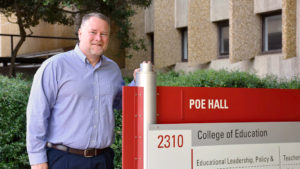Online Course Improvement Program Sees Continued Success

Lucky number seven. This year marks the seventh cohort of the Online Course Improvement Program at NC State — and the program continues to welcome high-quality faculty focused on high-quality online course design.
Congratulations to the Spring 2021 OCIP Cohort for their hard work and dedication to making their online courses the best they can be. Bruce Branson, Mary Michaels Estrada, Lori Foster, Jenna McChesney, Peter Koutroumpis and Kevin Oliver make up the latest cohort.
This group of faculty is dedicating their time and efforts to making improvements to their courses to earn official Quality Matters (QM) certification after completion of OCIP.
OCIP is a rigorous 16-week program where faculty put forth a significant time commitment to improving their online courses based on the QM Rubric Standards.
Meet the Spring 2021 OCIP Cohort
Bruce Branson

Professor of Accounting
Poole College of Management
During the shift to remote instruction due to COVID-19, Bruce Branson and the Department of Accounting transitioned their large-enrollment courses to the online environment.
This included Branson’s ACC 210: Concepts of Financial Reporting course, a requirement for all students in Poole College of Management. The course also regularly sees students from disciplines across campus. Branson has taught the course online in small sections over the past five years but recognized help was needed when the numbers for the online section went from 30-50 students to 600-900 students a semester.
“OCIP was a great opportunity to build out a course with patient guidance from DELTA experts that utilizes the Quality Matters framework,” he says. Branson also appreciates the active participation of the other OCIP cohort faculty and the one-on-one mentorship from DELTA staff.
On the importance of quality online courses, Branson adds, “This is a foundational course in our college and we simply have to ensure we are creating the best possible learning environment for our students. Our students deserve our very best effort in this endeavor as well. The QM certification process will help to ensure that the course is well-designed and easily navigated on Moodle. The emphasis on aligning instructional materials and assessments with course learning objectives is key to a high-quality experience.”
Mary Michaels Estrada

Lecturer
Department of Foreign Languages and Literatures
College of Humanities and Social Sciences
Mary Michaels Estrada got her first taste of working with DELTA on a grant project and after that was “hooked on partnering with DELTA to improve student learning outcomes.”
This experience led her to OCIP where she is focusing on improving FL 424: Linguistics for ESL Professionals.
“My goal in this process is to create a course where students feel supported and engaged,” she says. “Working in collaboration with other instructors across disciplines in my cohort, particularly when we are all working in relative isolation, has been an added bonus to the process.”
For the past 10 years, Estrada has taught college-level ESL in academic and business environments, both in the U.S. and abroad. She’s currently in her second semester of teaching FL 424 online.
“In a quality online course, learners feel connected with the material, one another, and the instructor,” she says. “The content is clear and easy to navigate, and course outcomes and assignments are aligned — that is to say, students aren’t frustrated by ‘busy work’ or by being assigned material that ‘wasn’t on the test.’”
Lori Foster and Jenna McChesney
Professor of Psychology and Doctoral Student
Department of Psychology
College of Humanities and Social Sciences

Lori Foster and Jenna McChesney have been co-teaching PSY 307: Industrial-Organizational (I-O) Psychology online for the last couple of years. The pair worked with Instructional Designer Rebecca Sanchez on a DELTA Grant in 2020 to revamp and move the course online and knew even after the grant was over there was still much to learn and improve.
“When Rebecca encouraged us to apply to OCIP, we were excited to have the opportunity to continue working with DELTA to build upon what we learned last year and really develop the course to its full potential,” Foster says.

McChesney notes as there are more courses online than ever before, measuring and guaranteeing the quality of those courses is extremely important — and the Quality Matters stamp of approval is one step toward quality assurance.
“QM certification means the course is going to be well organized, it’s going to include engaging material and provide opportunities to check one’s understanding, and perhaps most importantly, it’s going to be accessible,” McChesney says.
Accessibility is key for McChesney and Foster and a main factor in their decision to pursue QM certification.
“Virtual learning can be extra challenging for students with disabilities. We owe all students the opportunity to engage with a safe and supportive online learning environment, especially during a time when taking an online course might be required rather than optional,” Foster says.
Peter Koutroumpis

Senior Lecturer
Department of Health and Exercise Studies
Like instructors across the country, Peter Koutroumpis fully transitioned his courses online as a result of COVID-19 — a total of 10 sections of HESF 102: Fitness Walking over spring, summer and fall 2020. Koutroumpis has taught the course in various formats for the past seven years and recently decided to enhance his professional development by participating in QM’s flagship workshop, Applying the Quality Matters Rubric (APPQMR). Koutroumpis took the natural next step with OCIP where he plans to advance his current course content and also prepare for creating new content in the future based on QM standards.
“Detailed, current and accessible content is critical to the quality development of an online course,” Koutroumpis says.
He notes that students have said they appreciate how the current course is designed which allows them to appropriately plan how to complete and submit coursework. “Applying QM standards to the class content will only strengthen the course presentation and functionality for future students,” Koutroumpis adds.
“This is the path of the future for online class offerings at NC State and many universities and colleges, in my opinion,” he says. “Implementing QM standards to more courses will only enhance the content for student learning and illustrate the commitment faculty have made to apply a consistent structure to teaching that isn’t questioned as less than traditional in-person formats.”
Kevin Oliver

Professor of Learning, Design, and Technology
College of Education
Kevin Oliver brings a unique perspective to this semester’s OCIP cohort. He’s currently teaching an online course based on distance education — ECI 722: Theory and Research in Distance Education.
“I applied to OCIP to ensure this course met high-quality QM standards and provided a good model of distance education to students interested in the topic,” Oliver adds. “I appreciate [DELTA’s] multi-faceted approach to quality — APPQMR, Peer Reviewer Course, OCIP, etc. — and the different entry points for faculty with different levels of expertise.”
In regards to the impact of a QM certification, Oliver explains how OCIP and the QM standards help faculty prepare a course that is well organized and clear to students in terms of expectations while also encouraging further quality elements around student interactions with course content, other students and instructors, which is known to impact course success.
“The course mapping process where one lays out their course topics, aligned objectives, aligned materials, and aligned activities, helped me redesign my course to focus on a more organized set of topics that will better introduce my students to the field of distance education, related research, and principles of good design as they move into professions where they will likely be designing further distance experiences for their own students,” Oliver says.
About the Course Quality Program
NC State has 30 official QM-certified courses and more than 150 faculty and staff who have participated in QM training thanks to DELTA and the Course Quality team’s support.
Each semester, the team facilitates a variety of professional development opportunities based on the nationally recognized and research-based standards of QM. OCIP is part of the QM Certification Pathway.
It is easier than ever for faculty who are new to online teaching to get involved in the Course Quality Program. This spring, the Teaching Online Certificate was launched in a pilot phase for faculty with little to no experience with online teaching to complete a series of workshops based on online course design and pedagogy. Faculty earn digital credentials and a certificate upon completion.
Other pathways to quality assurance include the QM Essentials Pathway for faculty who currently teach online but have limited experience with quality course design and pedagogy and the Wolfpack Peer Reviewer Pathway for faculty who have been through QMESP or OCIP and are looking for further professional development as a peer reviewer.
The Course Quality Program is facilitated by a team of stellar DELTA staff members and faculty partners. Associate Director of Course Quality Bethanne Tobey leads the group and has been the driving force behind the program since its inception in 2018.
Jill Anderson, Christopher Beeson, Arlene Mendoza-Moran, Rebecca Sanchez, and Bethany Smith make up the team from DELTA and each serves as a mentor to an OCIP faculty member. Dmitri Mitin is serving as the faculty lead for OCIP, and Edwin Lindsay lends his expertise to the Quality Matters Essentials Standards Program as a faculty lead.
Keep an eye out for applications to the Course Quality Program’s pathways coming later this spring. Sign up to receive the DELTA Connections newsletter for monthly news, updates and resources related to teaching with technology at NC State.


